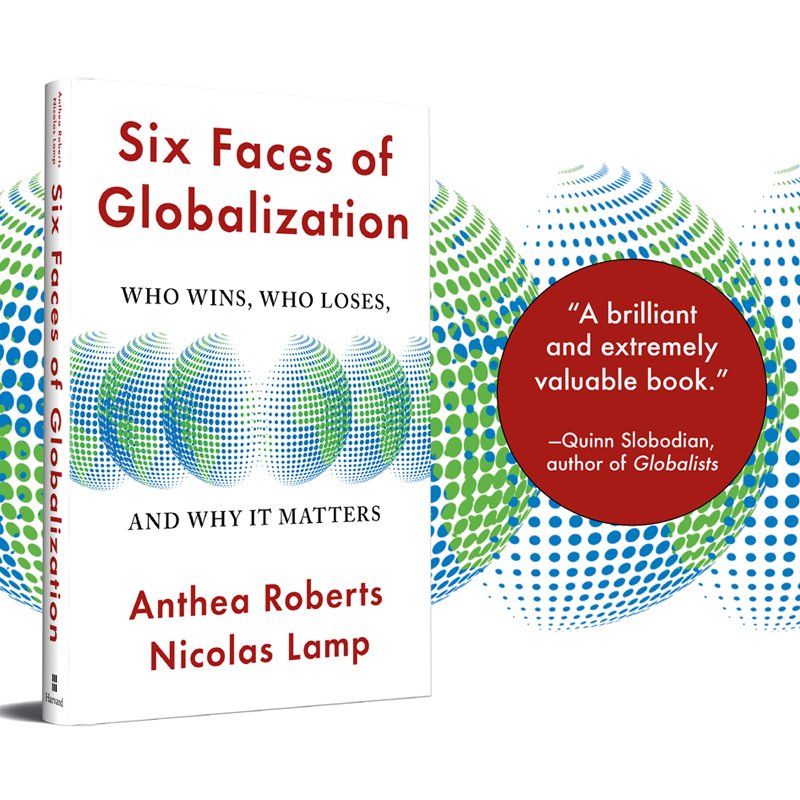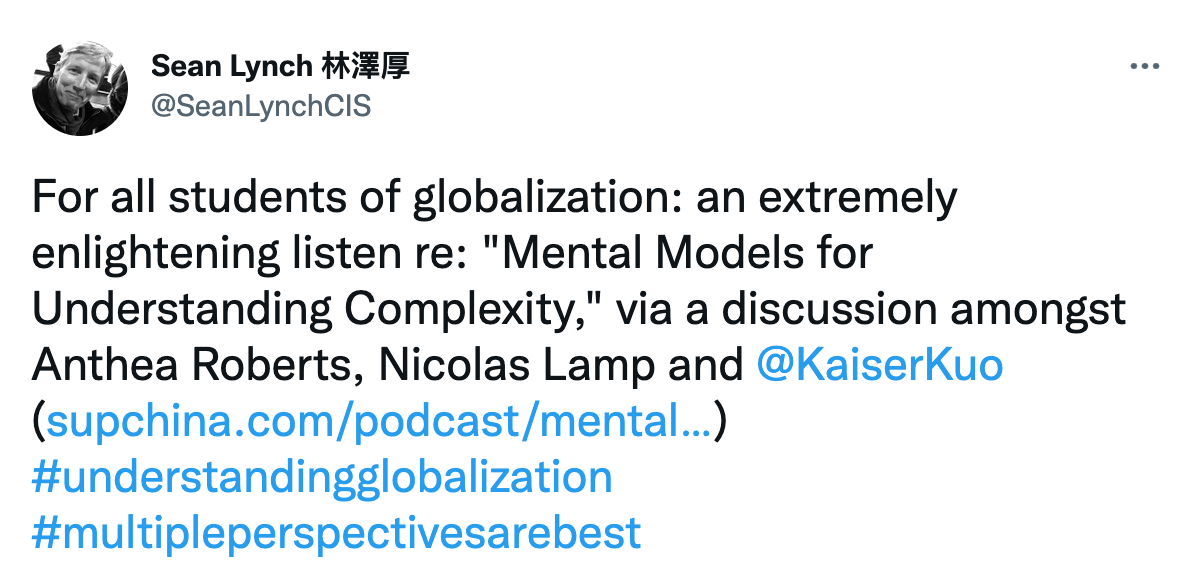Six Faces of Globalization
Who Wins, Who Loses,
and Why It Matters
Anthea Roberts and Nicolas Lamp
Harvard University Press, 2021
Featured in:
-

The best books of 2021, according to Fortune staff
-

Financial Times Best Books of 2021: Economics
-

Amazon Best Seller
in Foreign & International Law
Description
An essential guide to the intractable public debates about the virtues and vices of economic globalization, cutting through the complexity to reveal the fault lines that divide us and the points of agreement that might bring us together.
Globalization has lifted millions out of poverty. Globalization is a weapon the rich use to exploit the poor. Globalization builds bridges across national boundaries. Globalization fuels the populism and great-power competition that is tearing the world apart.
When it comes to the politics of free trade and open borders, the camps are dug in, producing a kaleidoscope of claims and counterclaims, unlikely alliances, and unexpected foes. But what exactly are we fighting about? And how might we approach these issues more productively? Anthea Roberts and Nicolas Lamp cut through the confusion with an indispensable survey of the interests, logics, and ideologies driving these intractable debates, which lie at the heart of so much political dispute and decision making. The authors expertly guide us through six competing narratives about the virtues and vices of globalization: the old establishment view that globalization benefits everyone (win win), the pessimistic belief that it threatens us all with pandemics and climate change (lose lose), along with various rival accounts that focus on specific winners and losers, from China to America’s rust belt.
Instead of picking sides, Six Faces of Globalization provides a holistic framework for understanding current debates. In doing so, the authors showcase a more integrative way of thinking about complex problems.
“A very smart book, and not just for people interested in globalization …. Highly recommended.”
Download the PowerPoint presentation for Six Faces of Globalization
Six Faces of Globalization - December 2021.pdf
Featured writings

“The book the world needs to read now. It deserves a spot on every shelf of books about globalization.”
– Richard Baldwin, Graduate Institute, Geneva
Review highlights
I sometimes describe books I review here as ‘Citizenship’ books. That is, the kind of book I think we should just buy a copy of for every adult and say ‘read this so you can participate in your society’. This is one such book. It doesn’t tell you how to think about globalization but is sure to improve the quality of your thinking about it. Not only by helping you learn a lot about globalization and its discontents, but also about how we need to try and see these issues in multi-faceted ways if we are to genuinely grapple with them.
Recommended.
- Andrew Carr, Goodreads
An essential guide to understanding today’s debates about the economic, social and geo-political effects of globalisation and what course it might take in the future. Roberts and Lamp distil six main narratives about globalisation used by supporters and detractors. If you want to understand Donald Trump’s election, or the current focus on economic sovereignty and security in countries like the United States and Australia, or why globalisation is less contentious in Asia than it is in the West, read this book.
- Richard Maude, Asia Society Australia
“This book is a tour-de-force that brings into focus most strands of debates over globalization. It is also beautifully written and a joy to read. Essential reading for readers interested in understanding current fault-lines over globalization.”
– Michael Trebilcock
“Policymakers and business leaders will appreciate this level-headed and wide-ranging look at a hot-button issue.”
“Six Faces of Globalization is a very smart book, and not just for people interested in globalization …. Ultimately, … this is a book not just about globalization, but also about the power and importance of narrative: how it is constructed and how it can contribute to a far more nuanced and complex understanding of the forces of change. Highly recommended.”
– Anne-Marie Slaughter, CEO, New America
“Roberts and Lamp present us with a real challenge: they lay out convincingly and comprehensively many different narratives of globalization and its political and economic effects. The book implicitly challenges the narrative that each of us finds most compelling …. [It] compels us to change our position, move out of our comfort zone, and see the world differently and more broadly.”
– Branko Milanovic, author of Capitalism, Alone
“[G]lobalization presents itself in different forms to its proponents and opponents. This immensely useful book clarifies the debates around globalization by developing six narratives rooted in contending values and perceptions of reality. It helps us not only understand the best version of other sides’ narratives, but also move beyond our own conceptual straitjackets.”
– Dani Rodrik, Harvard University
“Anthea Roberts and Nicolas Lamp have written a brilliant and extremely valuable book. They process an enormous amount of information but also, crucially, narratives and storylines about economic globalization and offer us a new way to sort and evaluate the various claims that circulate.”
– Quinn Slobodian, author of Globalists: The End of Empire and the Birth of Neoliberalism
“Roberts and Lamp set out to disrupt our intellectual inertia, first by mapping out the six major Western narratives of globalization, then exploring how those narratives drive policies, for better or worse. … Across all of these narratives, Roberts and Lamp ‘try to remove contempt from the discussion.’ Their approach rewards readers who keep an open mind.”
-James Herndon, Asian Review of Books
“Six Faces of Globalization is not one more big-think, grand-vision book on the world’s problems and how to solve them. Instead, it is an indispensable guide to how and why many people have abandoned the old, time-tested ways of thinking about politics and the economy. This is the book the world needs to read now. It deserves a spot on every shelf of books about globalization.”
– Richard Baldwin, Graduate Institute, Geneva
About the authors
Anthea Roberts is Professor in the School of Regulation and Global Governance at the Australian National University and author of the prizewinning Is International Law International?. In 2019, she was named the world’s leading international law scholar by League of Scholars.
Videos
Dialogue of Continents 2021 | DAY 1 | Nov 25 | 15:00 - 17:30. | Listen to Nicholas Lamp at 2:11:24
Book Talk | Six Faces of Globalization
Harvard Law School
Book Launch, “Six Faces of Globalization”, Australian National University
Keynote Address, Harvard International Law Journal, “Six Faces of Globalization”
Paul Krugman and Branko Milanovic in conversation with Anthea Roberts and Nicolas Lamp
Lecture, “Six Faces of Globalization”, Lauterpacht Centre for International Law
Podcasts
Globalisation was once seen, at least among the Western establishment, as a universal good: the 'rising tide that would lift all boats'.
Lately though, from the rise of Donald Trump to the challenges of Covid, that establishment view has come under increasing challenge from the very political powers that once supported it.
In their recent book, Six Faces of Globalization, Anthea Roberts and Nicolas Lamp have identified six different narratives that have emerged about globalisation—each with its own perspective on the winners, the losers, and the eventual answers.
Guests:
Anthea Roberts, Professor, School of Regulation and Global Governance, ANU
Duration: 29min 35sec Broadcast: Tue 15 Feb 2022, 7:15pm
Anthea Roberts and Nicolas Lamp, authors of the new book “Six Faces of Globalization” appeared on the Sinica Podcast to discuss China’s role in a changing world — and how to think about common narratives on this or any other complex topic.
Kaiser Kuo , 13 January 2022
Podcast with Anthea Roberts and Nicolas Lamp, authors of “Six Faces of Globalization: Who Wins, Who Loses, and Why It Matters”
Nicholas Gordon, Asian Review of Books, 4 November 2021
Radio
Anthea Roberts speaks with Adam Shirley on his show “Mornings” on ABC Radio CANBERRA.
(Segment begins at 2:07:16)
Anthea Roberts speaks with Amanda Vanstone on ABC RN Counterpoint.
(Segment begins at 15:10)
In the news
4 February 2022, Advisor’s Edge
11 December 2021, FORTUNE
9 December 2021, ISSD
23 November 2021, Brett Milano, HLS Correspondent
11 October 2021, BRINK
29 September 2021, ANU
What people are saying about the book
Reviews
Goodreads, Andrew Carr
Global Policy Journal, Branko Milanovic
Atlantico (in French)
Letras Libres (in Spanish)
Asian Review of Books, James Herndon
The Wire, Amiya Kumar Bagchi
Upcoming Events
MWP Book Roundtable, 16 February 2022, Emeroteca, Badia Fiesolana
Lecture, 25 February 2022, Center for Chinese Law, Hong Kong University, Hong Kong
Past Events
Panel discussion, Queen’s University, Canada
Lecture, Center for Global Law and Strategy, Renmin University of China
Webinar, ARTNeT Opening Plenary, WTO's Twelfth Ministerial Conference (MC12) at IISD's Trade and Sustainability Hub
Book presentation: “Six Faces of Globalization”, Directorate-General for Trade, European Commission
Book talk, “Six Faces of Globalization: Who Wins, Who Loses, and Why It Matters”, Harvard Law School
Book launch, “Six Faces of Globalization”, ANU
Lecture, “Six Faces of Globalization”, Lauterpacht Centre for International Law
In conversation, “Six Faces of Globalization”, London School of Economics
Presentation, “Six Faces of Globalization”, University of Oxford Public International Law Discussion Group
Keynote Address, “Six Faces of Globalization”, Harvard International Law Journal
Paul Krugman and Branko Milanovic in conversation with Anthea Roberts and Nicolas Lamp
Recommended
Australia in the World
Ep. 90: Lessons from 2021; expectations and hopes for 2022
For their first episode in 2022, Allan and Darren look back over the past 12 months, starting with the international landscape and then focusing on Australia. First up, what big lesson did 2021 teach them? Interestingly, both focus on the United States in their answers--but how much is domestic dysfunction in the US actually affecting Biden’s foreign policy? Second, did the world’s experience with COVID-19 over the past year affect any of the major trends in international affairs? While at the end of 2020 there seemed to be a clear dividing line between ‘competent’ and ‘incompetent’ government responses, that distinction appears far less clear a year later. Third, what other notable trends emerged or crystallised across the year? For Allan, signs of a reversal of the long period called “the great convergence” are quite concerning, while for Darren the big picture structural trends are mostly unchanged.
The Best Political Economy Books of 2021
A scholarly examination of market’s power toll on American workers, the collected works of a pioneering economic thinker, an ambitious narrative of US economic history, a first-hand account of how the American justice system is failing, and China’s antitrust exceptionalism: here are (in no particular order) some of the best books published during the past year.








































